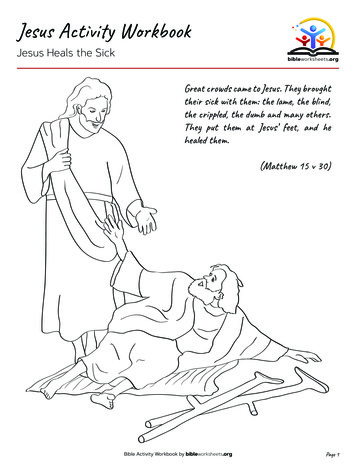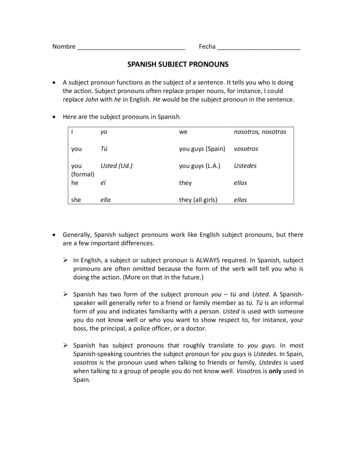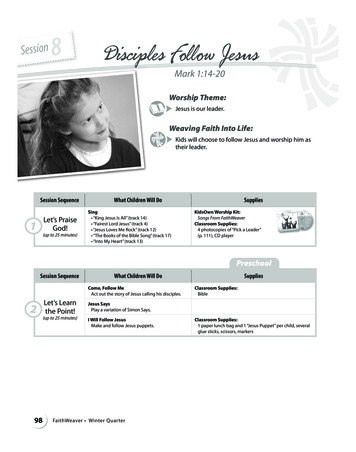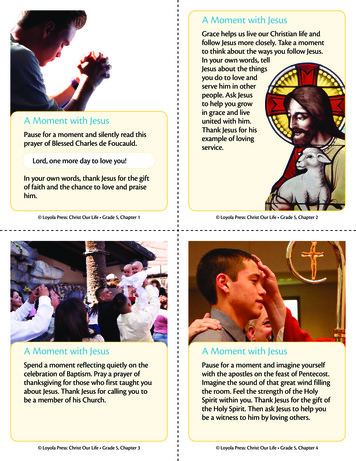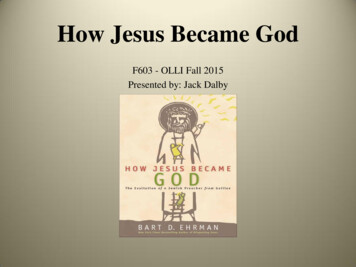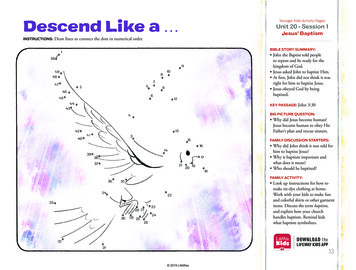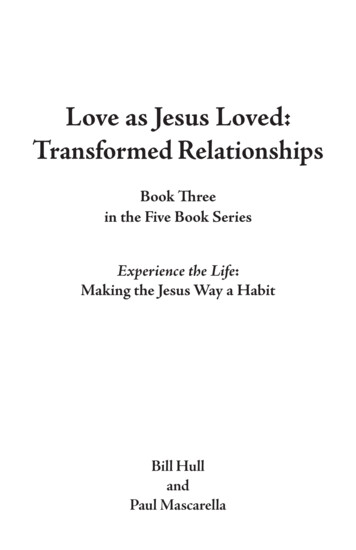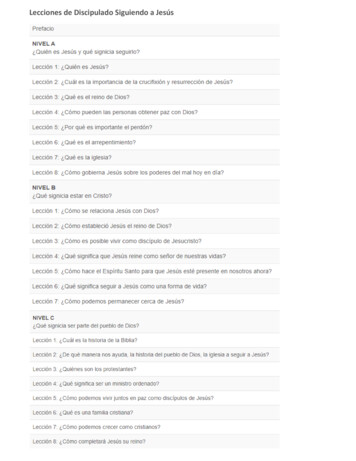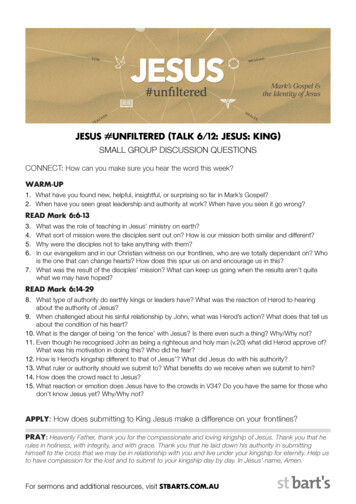
Transcription
JESUS #UNFILTERED (TALK 6/12: JESUS: KING)SMALL GROUP DISCUSSION QUESTIONSCONNECT: How can you make sure you hear the word this week?WARM-UP1. What have you found new, helpful, insightful, or surprising so far in Mark’s Gospel?2. When have you seen great leadership and authority at work? When have you seen it go wrong?READ Mark 6:6-13What was the role of teaching in Jesus’ ministry on earth?What sort of mission were the disciples sent out on? How is our mission both similar and different?Why were the disciples not to take anything with them?In our evangelism and in our Christian witness on our frontlines, who are we totally dependant on? Whois the one that can change hearts? How does this spur us on and encourage us in this?7. What was the result of the disciples’ mission? What can keep us going when the results aren’t quitewhat we may have hoped?3.4.5.6.READ Mark 6:14-298. What type of authority do earthly kings or leaders have? What was the reaction of Herod to hearingabout the authority of Jesus?9. When challenged about his sinful relationship by John, what was Herod’s action? What does that tell usabout the condition of his heart?10. What is the danger of being ‘on the fence’ with Jesus? Is there even such a thing? Why/Why not?11. Even though he recognised John as being a righteous and holy man (v.20) what did Herod approve of?What was his motivation in doing this? Who did he fear?12. How is Herod’s kingship different to that of Jesus’? What did Jesus do with his authority?13. What ruler or authority should we submit to? What benefits do we receive when we submit to him?14. How does the crowd react to Jesus?15. What reaction or emotion does Jesus have to the crowds in V34? Do you have the same for those whodon’t know Jesus yet? Why/Why not?APPLY: How does submitting to King Jesus make a difference on your frontlines?PRAY: Heavenly Father, thank you for the compassionate and loving kingship of Jesus. Thank you that herules in holiness, with integrity, and with grace. Thank you that he laid down his authority in submittinghimself to the cross that we may be in relationship with you and live under your kingship for eternity. Help usto have compassion for the lost and to submit to your kingship day by day. In Jesus’ name, Amen.For sermons and additional resources, visit STBARTS.COM.AU
JESUS #UNFILTERED (TALK 6/12: JESUS: KING)GOING DEEPER RESOURCESOn Your Front Line this Week How does the work you do point to God? If you are not sure, brainstorm with a friend and askGod to reveal it to you.For Families Download some of the family resources to use at home:stbarts.com.au/livestreamListen and Watch AUDIO: “The Twelve Sent Out” by Alistair /the-twelve-sent-out/ AUDIO: “Be Careful how You Hear” by Alistair /be-careful-how-you-hear/ AUDIO: “A Prophet Without Honour” by Dick 55172/Read: ARTICLES: “John the Baptist and Celebrity le/john-the-baptist-celebrity-culture/ ESSAY: “The Life of Christ” by Darrell ife-of-christ/Series Resources: RESOURCES: The Gospel of Mark (Video Overviews and More):stbarts.com.au/mark RESOURCES: Gospel Coalition Mark mark-courses/ VIDEO: The Bible Project Mark Overview:https://bibleproject.com/explore/mark/ VIDEO/AUDIO: iTunes U, Introduction to the Gospel of 5625271 VIDEO: Training on the Purpose of 66/For sermons and additional resources, visit STBARTS.COM.AU
Talk 6/12 (JESUS #UNFILTERED): 23 August 2020“Jesus: King”by the Rev’d Dr Daniel RouheadBible Passage: Mark 6:6b-36INTRODUCTION: KINGS & QUEENSIn the first five week of this series, we have learnt more about the identity of Jesusthrough the opening chapters of the Gospel of Mark. Jesus is the Messiah, the Son ofGod. He brings forth the Kingdom of God. He is also Forgiver, Healer and Grower.Today, we focus on Jesus as King.In Matthew, Chapter 2, the visiting Magi recognised Jesus as the “King of the Jews”,which King Herod perceived as a threat to his rule. Angered that the wise men didnot reveal Jesus’ whereabouts after their visit, Herod ordered the execution of all theinfant boys in Bethlehem and surrounding areas. Right from Jesus’ birth, hiskingship was contrasted with the rule of earthly kings.On September 9, 2015, Queen Elizabeth II surpassed Queen Victoria’s record reign of63 years and 216 days to become Britain’s longest-serving monarch. She is wellknown for her devotion to duty and service grounded in her experiences duringWorld War II. She is known to lead a simple and frugal lifestyle and takes a seriousand informed interest in government business, aside from her traditional andceremonial duties. She is a model modern ruler.But, history is filled with examples of less than ideal monarchs. Absolute power isknown to corrupt absolutely. Kings, Queens, Emperors and Empresses have abusedtheir power and exploited the people they were supposed to protect.Ferdinand I of Naples was said to have murdered his enemies, after falsely promisingthem amnesty, and added them to his museum of mummies dressed in their clothes.Ranavalona I of Madagascar, once demanded that a road be built before her eyes forher and her hunting party, with an estimated 10,000 subjects dying in the process.King John’s revenue-raising tactics to support his military campaigns to reclaimNormandy have been described as “avaricious, miserly, extortionate and moneyminded”.Jesus is not just the “King of the Jews”, he is the “King of the Universe”. He is unlikeearthly rulers who tax their subjects ruthlessly, who conscript their subjects to fightunjust wars, and who arrest, punish and execute their subjects arbitrarily.His ministry up to this point has revealed his authority over everything, seen andunseen. Jesus has healed many people with many different medical conditions,including those with leprosy. Jesus has driven out evil spirits who recognise him asthe “Son of God”. Jesus has forgiven sins. Jesus has taught with authority andclaimed to be Lord of the Sabbath. Jesus calmed the storm, the wind and the waves.Jesus raised a little girl back to life.
In today’s passage, Jesus’ rule is contrasted with the rule of Herod Antipas, the son ofHerod the Great. We see that Jesus is the true, compassionate King, while Herod isjust a pretender.1. JESUS: THE TRUE KING \\ VERSESWe see Jesus described first:“Then Jesus went around teaching from village to village. Calling the Twelveto him, he began to send them out two by two and gave them authority overimpure spirits (Verses 6b-7).Both the mission he sends his disciples on and the way he sends them reveal whattype of King Jesus is.Jesus continued his mission of teaching in the surrounding areas. Then hecommissioned the disciples for the work of preaching and healing. The disciples hadsat at his feet, had heard his teaching, and seen his miracles. Jesus wanted to usethem for his mission, so that what they had received, they might give; what they hadlearned, they might teach.True leaders delegate. They give important and specific tasks to their people that willallow them to learn and grow in their positions. Often times it would far easier forthe leader to simply do the task them self. They could get it done more quickly,effectively, and exactly to their liking. I wonder if Jesus thought that sometimesabout the disciples. However, true leaders understand that doing so allows no growthfor the people they are leading, and therefore they see an important aspect of theirrole as a delegator and a teacher to the people they lead. Jesus often spent time withjust his disciples teaching and equipping them for mission, preparing them for thework that was ahead of them.Jesus was also being practical. He knew there was a limited time for his earthlyministry. More people could hear the good news, and more people could be healed ifhe sent his disciples out to preach and heal.his kingdom could be enlarged moreefficiently.Jesus sent them out to preach the good news of the Kingdom of God, with authorityover evil and disease. Instead of sending his disciples out to collect taxes, or toconscript soldiers for his army, or to arrest accused criminals, as Kings wouldnormally do, Jesus sent his disciples out on a life-giving mission. Just as Jesus haddone, his disciples would proclaim the Kingdom of God through word and action,and point to Jesus as the King.Jesus gave them specific instructions:“Take nothing for the journey except a staff - no bread, no bag, no money inyour belts. Wear sandals but not an extra shirt. Whenever you enter a house,stay there until you leave that town. And if any place will not welcome you orlisten to you, leave that place and shake the dust off your feet as a testimonyagainst them” (verses 8-11).
Jesus did this for two reasons.Firstly, he wanted the disciples to totally depend on him. He didn’t want them to relyon their own resources, their own money or possessions, their own gifts or talents, indoing the work Jesus gave to them. He wanted the disciples to acknowledge Jesus asKing and rely completely on him.Secondly, he wanted their mission to point to Jesus, and him alone. Their totaldependence on Jesus would have helped others trust in him, too. Jesus also wantedto avoid any distractions or suspicion that they were engaged in any other businessthan the service of the Lord.It might seem harsh for them to just leave the places that didn’t respond to theirteaching and shake the dust off their feet. That’s what Jews would do if they had totravel through Gentile areas as a testimony against them. But the disciples’ job aspreachers wasn’t to change people’s minds. They were to persuasively present themessage; but if their audience didn’t receive it, they didn’t receive it – and they couldleave. Jesus did not seek to convert followers by force, as Kings often did, but fullyrespected the free will of individuals to accept him or reject him.“They went out and preached that people should repent. They drove out manydemons and anointed many sick people with oil and healed them” (verses 1213).The disciples were obedient and their mission was a great success. Many heard thecall to repent and believe the good news.many were healed and the influence of evilwas removed from many.We are called to the same mission – to tell people about Jesus and what his deathand resurrection mean for us and for them. We are, comparably, much more affluentthan Jesus’ disciples. We can be tempted to rely on our own resources rather thanthe King’s resources. These things draw us away from Jesus but can also be adistraction for those we’re trying to minister to. We need to think about how we cansimply and directly tell others about Jesus in our words and our actions. We don’tneed to be worried about the outcome. Some will hear us and believe.some will seeus and believe.but many won’t. That shouldn’t deter us from being obedient to ourKing’s call.2. HEROD: THE PRETENDER \\ VERSESWe now turn to an earthly king, or so-called king. As we hear the story of Herod andJohn the Baptist, we see that Herod is a pretender in terms of his identity and hischaracter.In verse 14: “King Herod heard about this, for Jesus’ name had become wellknown”.King Herod is not the same King Herod from the birth narrative in Matthew. ThisHerod, is King Herod or Herod the Great’s son, known also as Herod Antipas. WhenKing Herod died, his kingdom was divided amongst his sons. Herod Antipas was
given control over Galilee and Perea and given the title, “tetrarch” by RomanEmperor Augustus.So, Mark used the title “King Herod” because, either it was the local custom to callhim king, or more likely he used it ironically. Even though he yearned the title, henever possessed it.and, the power he did have was delegated by another morepowerful than him, the Roman Emperor.Herod was a pretender because he wasn’t actually a king, and he certainly didn’tbehave like one.Herod’s guilty conscience was on display as he responded to news of Jesus and hisdisciples: “Some were saying, “John the Baptist has been raised from the dead,and that is why miraculous powers are at work in him.” Others said, “He isElijah.” And still others claimed, “He is a prophet, like one of the prophets oflong ago.” But when Herod heard this, he said, “John, whom I beheaded, hasbeen raised from the dead!”” (verses 14b-16)There is no mention of John the Baptist in Mark’s gospel after Jesus was baptised,except for the fasting of John’s disciples mentioned in Chapter 2. We find out aboutJohn’s death before the circumstances are described, which reveal that Herod wasstill troubled about his decision to execute John.John had been arrested because he condemned Herod’s marriage to Herodiasbecause she had been married to Herod’s brother’s. John spoke boldly to power,pointing out Herod’s sin with no regard for the consequences of doing so. Herodiaswas, unsurprisingly, upset about John’s accusations. He was, in her opinion, anobody, and should remain silent.Herod, on the other hand, was conflicted. He knew that John was a righteous andholy man. He was confronted by his directness, but was intrigued by his teaching andhis lifestyle. Herod was caught between the wrath of his wife, and his respect forJohn. Eventually, the situation came to a head.“Finally, the opportune time came. On his birthday Herod gave a banquet forhis high officials and military commanders and the leading men of Galilee.When the daughter of Herodias came in and danced, she pleased Herod andhis dinner guests. The king said to the girl, “Ask me for anything you want,and I’ll give it to you.” And he promised her with an oath, “Whatever you ask Iwill give you, up to half my kingdom.” (verses 21-23)Herod offered a grand gesture to his wife’s daughter. This story is a warning aboutthe promises and oaths we make – even if our oaths and promises lead us down thewrong path, we need to be courageous enough to do the right thing.This was the moment Herodias was waiting for. There seems to have been nohesitation when Herodias was asked by her daughter what she should request – itseems all pre-planned – John the Baptist’s head. Her daughter’s request to Herodseemed to go one step further when she demanded John’s head on a platter. Not onlydid she want John dead, to please her mother, she wanted John to be publicly
humiliated in front of Herod’s guests, as she felt her mother had been humiliated byJohn.Once more, Herod was distressed. He knew that John was righteous and holy, but hehad made an oath in front of many important witnesses. He could have done theright thing, but this would have caused great humiliation to himself. In the end, theweakness of Herod’s character was laid bare as he succumbed to the wishes ofHerodias and the pressures of embarrassing himself in front of his guests.Herod revealed how unfit he was to rule. He lived in an inappropriaterelationship.asking his wife’s daughter to dance in front of his guests wasinappropriate.he made an inappropriate promise.he made his decision on John’slife based on the wrong criteria.How was John able to be so bold in his preaching? He trusted completely in Jesus asthe Messiah, the Lamb of God, who takes away the sin of the whole world. Jesus, thetrue King. I hope we are all inspired by his example to trust in Jesus, the true King,and to be bold ambassadors of Christ on our frontlines.CONCLUSION: THE COMPASSIONATE KINGAt the end of this section, Jesus tries to withdraw to a quiet place with his disciples tospend time with them, listening to their experiences and teaching them.giving themspace to rest and eat.“But many who saw them leaving recognized them and ran on foot from all thetowns and got there ahead of them” (verse 33).Even though Jesus’ plan was interrupted by the crowds who wanted more ofJesus.who needed more of Jesus.Jesus considers their needs first.“When Jesus landed and saw a large crowd, he had compassion on them,because they were like sheep without a shepherd. So, he began teaching themmany things” (verse 34).There is no anger.he doesn’t send them away.he meets their spiritual and physicalneeds. He is the true King who died and rose again because of his great love us.Queen Elizabeth II is a revered monarch, but she is not perfect.and, one day, her rulewill come to an end.but Jesus rules over everything.forever.Let us pray.
In today's passage, Jesus' rule is contrasted with the rule of Herod Antipas, the son of Herod the Great. We see that Jesus is the true, compassionate King, while Herod is just a pretender. 1. JESUS: THE TRUE KING \\ VERSES We see Jesus described first: "Then Jesus went around teaching from village to village. Calling the Twelve
